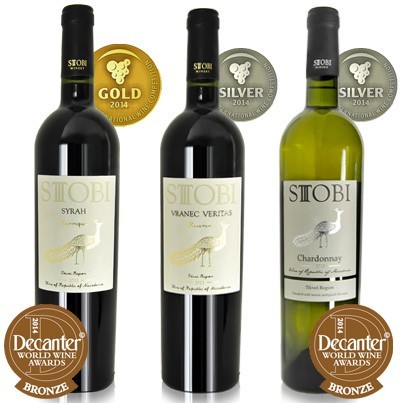All that glitters – a look at wine judging
Posted on Mon 13th Jul 2015 at 14:41

I’m just back from judging at the Balkan International Wine Competition in Bulgaria where Stobi won a gold medal for their Syrah 2011 and Silvers for Vranec Veritas Reserve and Chardonnay.
Stobi also recently picked up medals at the Decanter World Wine Awards (DWWA for short) - bronzes for Syrah and Chardonnay. There are numerous wine competitions in the world with very different reputations and approaches to judging, many of which I have experienced. Many words have been written on the topic of how reliable the results are and it is always worth remembering that all a competition can do is show a snapshot of a particular wine on that day, tasted by those particular judges. Most competitions do try to make judging as objective as possible, often by using a panel of judges, but of course human subjectivity, along with differing taste thresholds (more on that another time) and personal likes and dislikes cannot help but be a factor. Personally, I prefer the consensus judging approach taken by DWWA and also used at Balkan International Wine Competition (BIWC). A panel of 3 judges plus a chair will taste a line-up of no more than 15 wines that share a similar theme, served blind. We then make notes and give scores individually. After this, the panel discusses each wine in detail, agreeing a final medal score after deep consideration. This gives an opportunity if a judge really loves a wine that others have missed to argue its merits, or indeed confirm why it doesn’t deserve a higher medal.
At Decanter, the standard is that a commended wine must be good to drink and offer more then simply being clean and correct. A bronze medal means the wine really is very good, while silver goes to excellent wines and the golden bling (which is rare – only a tiny % of wines reach this heady height) only gets handed out to truly world class and genuinely exciting wines. Decanter only recruits judges who have a strong track record (Masters of Wine, major journalists, key wine buyers, top sommeliers, etc.). These are people with good levels of specialist knowledge about the category of wines they are tasting – but can also put them in a global context. BIWC is has only been going for 3 years now but uses a similar approach and carefully selected international judges (including yours truly). The concept here is also to use consensus judging but in the slightly narrower context of Balkan wines only. The other approach used by many wine competitions around the world is to use a strict set of rules and a mark grid invented by the OIV (Office International de la Vigne). Each wine is tasted in total isolation with no information about its grape or origin, but specifies certain marks for colour, genuineness (whatever that means when you don’t have any context for the wine), persistence and so on. This is supposed to lead you to an overall rating and claims to remove subjectivity. This may be fair enough but it doesn’t reward innovation or wines that are good but not typical. In addition, there will be a minimum of 5 judges, and top and bottom marks are removed with the remaining marks averaged, so scores tend to cluster closely in the middle. There’s little incentive to reward a wine highly as your marks will be deleted so judges do tend to “play safe”. Finally the top 30% of wines received medals - almost a reward for turning up in some cases.
As far as the UK market is concerned, few of these OIV competitions (such as the various Concours Mondial or “some grape variety” du Monde) make any difference to wine drinkers. In the end does a medal matter at all? All competitions have their flaws but on balance I would still say yes, at least for the best globally recognised competitions. For a relatively new producer (like Stobi) from a country no one has heard of trying to find a place in a new market, medals can help. Competitions judged by some of the world’s wine experts give a message that these wines were judged good enough for a medal by global standards. And that can help give buyers and consumers a little bit more courage to try something new. Written by Caroline Gilby; Master of Wine, for Signature Wines Ltd.

